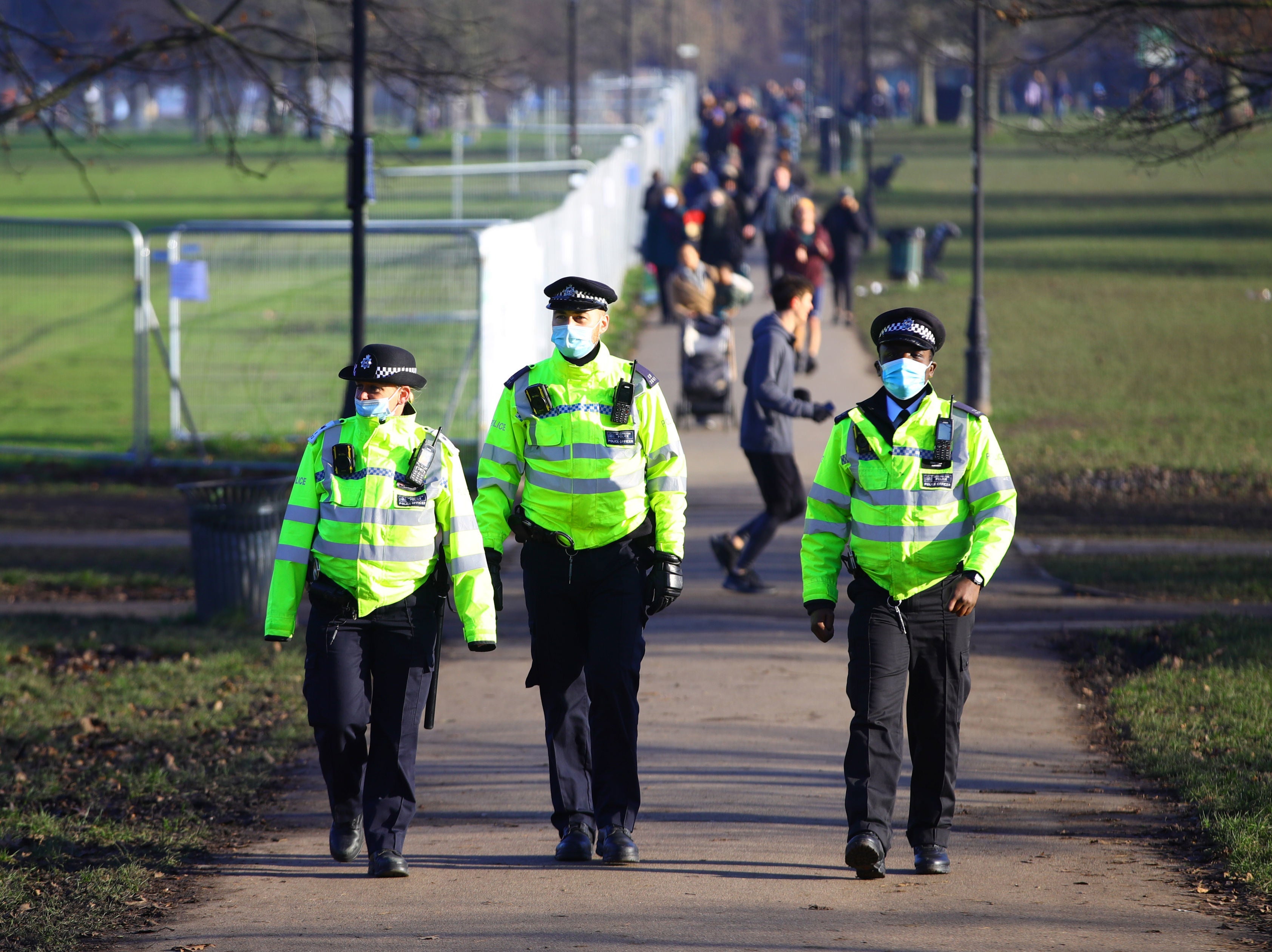Police leaders discussing ‘more proscriptive’ lockdown laws with government
Differences between law and government guidance on exercise and travel causing issues, senior officers say

Police are in discussions with the government about taking a “more proscriptive” approach to lockdown, amid confusion over the differences between law and guidance.
Senior officers told parliament’s Home Affairs Committee that greater clarity was needed on what kind of exercise is permitted and how far people are allowed to travel for it.
While government guidance for England states that people should exercise outside once a day, and in their local area, those limits are not set in law and cannot be enforced by police.
The issue hit headlines after Derbyshire Police wrongly fined two women who drove to a reservoir for a walk, and then withdrew the penalty.
Some ministers appeared to support the fine, but Boris Johnson was then criticised for cycling seven miles from Downing Street.
Assistant Chief Constable Owen Weatherill, the national police leader for the coronavirus response, said travel for exercise had become a “real challenge” for officers, particularly those policing national parks and beauty spots.
“Travel itself is not illegal, it’s about the activity and the circumstances for it and that’s where it gets into the realm of subjectivity,” he told MPs on Wednesday.
“There is an active conversation at the moment with the Home Office and the Department of Health as to how we might be able to improve that to give greater clarity to the public and also to our officers.”
Mr Weatherill admitted there would be “no perfect answer” for everybody, adding: “None of us would choose to be in the environment we’re in but we have to proscribe it in some shape or form.
“There was a deliberate effort to try and make [the law] flexible initially so there was a degree of freedom of choice for people, and you could exercise some of the decisions you wanted to within certain ranges, but that clearly is presenting other problems. We now need to think, 'Is there a better way of doing that?' Would we like better proscription?
“I think it would be helpful if we could be a little bit more proscriptive in some respects, so it may be that we need to add some extra definition to it to help people understand it.”

Senior police officers told the committee that differences between the laws in coronavirus tiers and local lockdowns had also made enforcement difficult.
Adding to the complexity, there are different laws in place for Wales, Scotland and Northern Ireland.
The package of laws underpinning the lockdown, called the Health Protection Regulations, has been updated 65 times since March to apply to different levels of restrictions, local lockdowns and rules for masks and quarantine.
More than 32,000 coronavirus fines issued were in England and Wales between 27 March and 21 December.
The largest proportion were handed out for violating the first national lockdown, around 6,500 for the second national lockdown, 3,000 under the first “local Covid-19 alert levels” law and 1,600 under the “all tiers” regulations, which have since changed.
Chief Constable John Campbell, of Thames Valley Police, said England’s lockdown restrictions were “clearer than it has been” but that mistakes by officers were inevitable.
“Unfortunately these examples will arise and will continue to do so,” he added. “We won’t get it right every single time but to put it in context, thousands and thousands of interactions are happening between officers and the public every single day.”
He said recent controversies, which have sparked accusations of both heavy-handedness and under-enforcement “do not reflect day-to-day engagement”.
Chief Constable Carl Foulkes, of North Wales Police, said his officers had issued just 300 fines from 10,000 engagements with people believed to be breaking the law.
“We will get things wrong, we’re human, and when we do that we need to put up our hands and learn from it,” he added.
Some police forces have been considering individual challenges to fines, but human rights groups have been calling for a formal process.
If the penalties are not paid within 28 days, people may be prosecuted for a criminal offence.
Official guidance states that officers should be engaging with people, explaining the law and encouraging them to follow it voluntarily before moving to enforcement.
The guidance has not changed since March, but in October the National Police Chiefs’ Council (NPCC) told officers they did not have to ask people to follow the law multiple times before issuing a fine.
“The number of fines is not the test of whether we’ve been successful, it’s about compliance,” Mr Campbell said.
Mr Faulks said his officers “do not want to be enforcing Covid regulations”, amid near-normal crime levels and rising absence rates due to coronavirus.
Mr Weatherill said police should not be responsible for public compliance with the rules, and called for “collective responsibility” from businesses, employers and individuals.
The comments came after some supermarkets said they would step up enforcement of in-store Covid measures.
Morrisons said customers who refuse to wear a mask without a medical exemption will be told to leave its stores, while Sainsbury's said its security staff will “challenge” shoppers who are not wearing masks or who enter stores in groups.
Police leaders had called for businesses to enforce mask rules when they came into force over the summer, but several large chains initially refused.
Mr Campbell called for shops to make wearing a mask a condition of entry, for people who are not exempt from the law, to reduce the number of calls to police.
Officers said they would still respond to incidents in shops where people were being abusive or violent towards staff.
Join our commenting forum
Join thought-provoking conversations, follow other Independent readers and see their replies
Comments




Bookmark popover
Removed from bookmarks